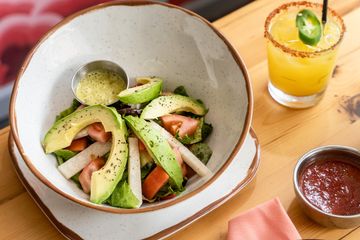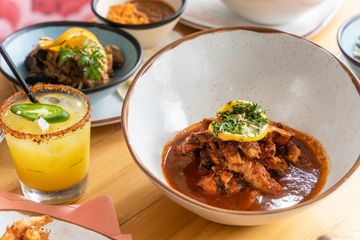Is Mexican Food Healthy? Unloading the Nutritional Conveniences of Traditional Components
The concern of whether Mexican food is healthy and balanced welcomes an exploration of its conventional ingredients. Beans and corn function as foundational staples, abundant in healthy protein and fiber. Avocados supply beneficial fats, while various herbs and spices add taste and health and wellness advantages - New York Times rated. Together, these parts produce a tapestry of nourishment. However, the healthiness of Mexican cuisine often depends upon preparation techniques and portion dimensions. What duty do these factors play in identifying its general nutritional worth?
The Power of Beans: Healthy Protein and Fiber-Rich Staples
Although commonly forgotten, beans act as a foundation of Mexican cuisine, providing a wide range of nutritional benefits. Rich in protein, they are an exceptional plant-based choice for those seeking to fulfill their nutritional protein needs. This high protein material sustains muscle mass repair work and growth, making beans very useful for both vegetarians and meat-eaters alike. Additionally, beans are an outstanding resource of nutritional fiber, which helps in digestion and promotes a sensation of volume, potentially aiding with weight administration.
The variety of beans used in Mexican recipes, such as black beans, pinto beans, and kidney beans, adds to a varied taste profile and can improve meals nutritionally. Beans are low in fat and include vital vitamins and minerals, including folate, iron, and magnesium. With each other, these qualities make beans a crucial ingredient, providing both nutrients and food in typical Mexican price.

Corn: a Versatile Grain With Nutritional Advantages
Corn stands apart as a flexible grain basic to Mexican cuisine, commemorated not only for its cooking applications however additionally for its remarkable dietary profile. As a primary component in meals like tortillas, tamales, and pozole, corn offers necessary nutrients that contribute to a balanced diet regimen. Rich in carbohydrates, it works as a significant power resource, while likewise being reduced in fat, making it a favorable choice for various nutritional requirements.
Corn is an excellent source of nutritional fiber, which aids in food digestion and advertises satiety. It includes considerable amounts of vitamins such as B-complex vitamins, which are necessary for basal metabolism. The existence of antioxidants, specifically carotenoids, adds to total health by minimizing oxidative anxiety. Additionally, corn is gluten-free, dealing with those with gluten level of sensitivities. Generally, the dietary benefits of corn highlight its relevance in traditional Mexican food and its duty in a healthy diet regimen.
Avocados: Healthy Fats and Nutrients in Every Bite
Avocados play a substantial duty in Mexican food, matching recipes with their velvety appearance and abundant taste. Beyond their culinary allure, avocados are commemorated for their outstanding dietary profile. They are a rich source of healthy monounsaturated fats, which can aid lower negative cholesterol degrees and assistance heart health and wellness. Additionally, avocados are packed with vital vitamins and minerals, consisting of potassium, vitamin E, and B vitamins, adding to general health.
The high fiber content in avocados aids food digestion and advertises satiety, making them a useful enhancement to any meal. Their one-of-a-kind nutrient structure can also support skin health and provide anti-inflammatory benefits. Integrating avocados into typical Mexican meals or appreciating them as a standalone treat can enhance both flavor and nourishment, demonstrating why they are a cherished staple in Mexican food. On the whole, avocados provide a scrumptious means to appreciate healthy and balanced fats and important nutrients in every bite.

Spices and Natural Herbs: Flavorful Wellness Boosters
While enjoying the rich flavors of Mexican cuisine, one can not forget the necessary role that spices and herbs play in enhancing both preference and wellness. Components such as oregano, cilantro, and chili peppers not just add to the vibrant taste account yet likewise give substantial health advantages. As an example, cilantro is known for its purifying residential properties, assisting to remove hefty steels from the body, while oregano is loaded with antioxidants and possesses anti-inflammatory effects.
Chili peppers, a staple in many Mexican meals, consist of capsaicin, which has been linked to enhanced metabolic rate and pain alleviation. In addition, seasonings like cumin and coriander support digestion and may help in blood glucose law. healthy fast food Integrating these delicious health and wellness this hyperlink boosters right into meals not only enhances the cooking experience yet additionally advertises general well-being, making Mexican food not simply tasty, yet likewise nutritionally advantageous.
Standard Cooking Methods: Enhancing Nourishment and Taste
Typical cooking approaches in Mexican cuisine play an important duty in boosting both nutrition and flavor, as they usually prioritize fresh ingredients and classic techniques. Methods such as nixtamalization, where corn is saturated and cooked in an alkaline remedy, not only enhance the nutrient profile of tortillas however additionally improve their digestibility - lunch and dinner. In addition, using slow-moving cooking techniques, like cooking or braising, allows tastes to meld beautifully while maintaining the stability of the components
Often Asked Questions
Are Mexican Food Portions Typically Larger Than Various Other Cuisines?
Mexican food portions are usually bigger than those of numerous various More Info other cuisines. This characteristic shows conventional eating methods, emphasizing common sharing and hearty meals, which can bring about a much more significant serving dimension generally.
How Does the Prep Work Method Affect Healthfulness of Mexican Food?
Preparation techniques significantly affect the healthiness of Mexican food. Strategies such as barbecuing or steaming maintain nutrients, while frying can enhance harmful fat content. Options of ingredients and cooking styles inevitably identify total nutritional value.
Can Mexican Food Be Customized for Particular Nutritional Restrictions?
Mexican food can undoubtedly be tailored for certain nutritional limitations. Replacements, such as utilizing corn tortillas for gluten-free diet regimens or incorporating even more veggies, allow people to enjoy standard tastes while accommodating different dietary needs.
What Are Usual Misunderstandings Concerning Mexican Food and Health?
Usual misunderstandings concerning Mexican food include the idea that it is naturally undesirable, extremely zesty, and solely concentrated on fats. Actually, traditional meals usually include nutritious components and can be customized to different nutritional demands.
Are There Healthier Choices at Mexican Restaurants?
Much healthier choices at Mexican dining establishments commonly consist of grilled meats, beans, and fresh vegetables. Picking meals that emphasize whole ingredients and preventing hefty sauces can cause a much more healthy dining experience, promoting total health.
The range of beans made use of in Mexican dishes, such as black beans, pinto beans, and kidney beans, adds to a varied flavor profile and can improve meals nutritionally. Avocados play a significant role in Mexican food, enhancing recipes with their velvety structure and rich flavor. Including avocados right into standard Mexican meals or enjoying them as a standalone treat can improve both flavor and nourishment, showing why they are a cherished staple in Mexican cuisine. While enjoying the abundant tastes of Mexican cuisine, one can not overlook the crucial duty that spices and herbs play in enhancing both preference and health and wellness. Conventional food preparation approaches in Mexican cuisine play an essential duty in improving both nutrition and taste, as they typically prioritize classic techniques and fresh ingredients.